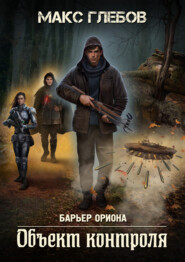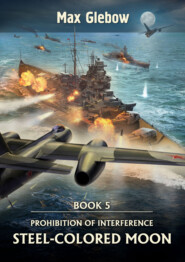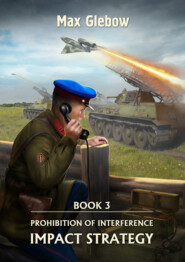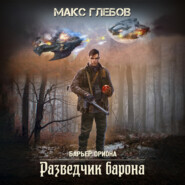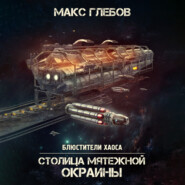По всем вопросам обращайтесь на: info@litportal.ru
(©) 2003-2024.
✖
Prohibition of Interference. Book 4. Asymmetric response
Настройки чтения
Размер шрифта
Высота строк
Поля
“Are you suggesting to pelt Nagulin with corpses, Colonel?” asked the General with doubt in his voice. It was clear that he was thinking hard about the information he had received, but had not yet come to any definite conclusions.
“To be perfectly cynical, one could say that,” Richtengden shrugged. “Casualties will inevitably be high, but it is not so easy to destroy such an unusual enemy.”
“Then what is your idea?”
“The marksman has been practically inactive at the front for a week now. I think the Russians are preparing something. Herr General, what do you think is our most vulnerable point right now, a strike on which could significantly disrupt all of our plans?”
“The air bridge created by the Luftwaffe to supply troops caught in the Moscow Pocket,” the General answered without hesitation. “Reichsmarshal Göring was able to surpass himself. Our troops in the south and near Leningrad groan from the lack of effective air support, but more than a thousand transport planes under dense fighter cover uninterruptedly deliver supplies to the encircled troops, and Russian aviation can do nothing about it, although there have been attempts. Fortunately, they were unsuccessful. The enemy had lost too many planes, supporting his tank offensive at Vyazma, and had simply run out of steam.”
“I have come to a similar conclusion, Herr General,” Richtengden nodded. “I think this is where we should expect another attack of the marksman. Except that he prefers to fly out at night, and the air bridge operates during the day.”
“Night strikes on airfields are possible. This has already happened in Nagulin's practice.”
“We're ready for this kind of development,” the Colonel objected, “The airfields of transport planes are well protected, and the planes themselves are dispersed and thoroughly camouflaged at night.”
“And how do you think Nagulin will act?”
“I think he's going to control the fire from the ground. The Russian 85 mm anti-aircraft 52-k guns can fire at aerial targets at altitudes up to ten kilometers, while our Junkers transport planes do not go above six kilometers. In addition, Heinkel He-111 bombers involved in cargo transports have a practical ceiling of 8,000 meters. At these heights the Russian anti-aircraft gunners rarely manage to hit our planes, but if the marksman takes over…”
“Okay, let's say that's the case. What's next?”
“And then everything is simple enough. As soon as any of our groups of transport planes come under abnormally accurate fire from the ground, we will know exactly where the marksman is at the moment. One of our cover fighters will immediately signal the air strike group, which we will have to prepare urgently and keep in constant readiness for departure. As soon as its commander receives the signal, he will lift his machines into the sky and strike at the position of the Russian anti-aircraft guns controlled by Nagulin.”
“The marksman will surely be well protected,” objected the General. “I think at the first sign of an air attack, he will immediately take cover in some secure shelter. I'm sure the Russians will try to build a dugout for him that can only be destroyed by a direct hit from a heavy bomb. And there is also the option of controlling fire by radio, as he has done repeatedly.”
“Anti-aircraft fire requires an immediate response to aircraft maneuvers. There will inevitably be delays when using a radio, and firing efficiency will drop dramatically. I'm sure the marksman will take the place of the gunner in one of the anti-aircraft guns or lead the crew of the anti-aircraft battery fire control unit. Besides, I don't think Nagulin will run to the dugout if we attack,” Richtengden grinned. “Even though he is an Untermensch, he never once gave us a reason to doubt his courage. He will not abandon his comrades and will try to repel the raid. But even if he is ordered and forcibly evacuated to a dugout, we have a means of making sure he does not leave this position alive.”
“Is this some kind of novelty again?”
“Naturally. It would be too presumptuous to count on the guaranteed destruction of the marksman without such surprises. Three years ago, in 1938, our scientists, trying to create a powerful new pesticide, synthesized a substance that completely changed our understanding of toxic gases. This organophosphorus nerve agent was called sarin. Its advantage is that it affects people not only through the respiratory organs, but also through the skin. The only way to protect oneself from sarin is to wear a full hazmat suit, which I'm sure Nagulin won't have. Industrial production of this gas has not yet been mastered anywhere in the world, but as I found out, with the help of experimental facilities we have already produced about 20 kilograms of sarin. Given its extreme toxicity, this is enough to equip several dozen aerial bombs, which we would use in conjunction with conventional high-explosive and fragmentation munitions.”
The General looked at Richtengden with a long, mixed feeling look. The very idea of using poisonous substances in war was clearly not to his liking, but the Colonel's suggestion had a rational basis. The Führer, by his personal order, authorized the use of war gases, and now the Abwehr had its hands free in this matter as well.
“By using sarin gas against the position of the Russian anti-aircraft gunners, we can disrupt the plans of the Wehrmacht command to conduct a surprise chemical attack on the Russian troops,” the General raised his final objection.
“I don't think it matters anymore. The transfer of Kleist's Panzer Group to Vyazma is almost complete. We are only days away from the start of our offensive. The Russians simply would not have time to do anything, even if they realized in time what they were dealing with.”
“You may be right, but I cannot authorize such an operation without the approval of Admiral Kanaris and Reichsmarshal Göring. It may well require the personal approval of the Führer. Nevertheless, you should begin preparations immediately. With all the problems the marksman has already created for us, I'm sure your plan will be approved fairly quickly and without significant changes.”
* * *
“Comrade Zhukov, are you sure that the enemy is really able to organize a sufficient supply of food and ammunition for the surrounded troops?”
“That depends on what is considered sufficient, Comrade Stalin. The cargoes delivered by the Germans by air would certainly not be sufficient to maintain the combat effectiveness of Army Group Center for a long time. However, we all understand that the enemy is preparing a breakthrough, and we will not have to wait long for a German offensive. Surrounded troops can hold out on that supply for a couple of weeks, and then everything will depend on our ability to repel an unblocking strike.”
Stalin nodded, cast a brief glance at the map and turned to Shaposhnikov.
“Boris Mikhailovich, how do you assess the ability of our troops to prevent the ring of encirclement from being broken through?”
“The situation is not easy, Joseph Vissarionovich. We put ourselves out too much, closing the pocket and repelling enemy counterattacks. The number of divisions was reduced to two or three thousand men. Tank brigades have lost up to 60 percent of their combat vehicles, and the artillery is short of shells. The situation with aviation, unfortunately, is even more complicated. We failed to shake German air superiority, and after the losses we suffered, the balance of power shifted even more in favor of the enemy. Nevertheless, we now have a fairly stable position on the outer front of the encirclement, and if the enemy limits itself to a blow from the outside, our chances of holding out are quite high, but we can hardly count on the Germans inside the ring to behave passively. As long as the Luftwaffe deliver fuel and ammunition to them, we cannot ignore the possibility of their strike towards the Kleist tanks. Besides,” Shaposhnikov hesitated slightly, “there is one more circumstance. So far, these are just the conclusions of analysts, but I would not disregard them.”
“Go on, Boris Mikhailovich,” Stalin raised an eyebrow slightly, “my comrades and I are listening to you attentively.”
* * *
I didn't like the order I got. This was probably the first time the Headquarters of the Supreme High Command decided to use my capabilities of their own free will, rather than on my own initiative.
I was well aware that the air bridge created by Göring had become a pain in the ass for Comrade Stalin and his generals. As a result of the counteroffensive at Moscow, the Red Army had taken such a large and fat bite that it was now having obvious problems to chew it up. And the bite itself was very tasty, but slimy and wily, and it wanted to slip out of the mouth at any second. Now the solution to this problem, or rather its most unpleasant part, was entrusted to the humble Lieutenant Colonel Nagulin.
Why? Did you let the bridge over the Dnieper sink? Yes, you did! So now you'll bring down the air bridge with similar success, and we'll help you. And if you fail, we're sorry…
However, there was another problem that worried me even more than the task of giving Reichsmarschall Göring a good thrashing, that suddenly fell to me. The Headquarters of the Supreme High Command took my conclusions about a chemical attack being prepared without due attention. They did not dismiss Shaposhnikov's words, but did not take them seriously either, just made a formulaic entry in the minutes of the meeting in the style of "to step up training…, to check the availability of necessary equipment in the troops…, to correct drawbacks…" and everything in the same vein. The air bridge and the impending attack by Kleist's tanks worried the Soviet leadership far more than some hypothetical chemical threat.
Nevertheless, Shaposhnikov realized that there really was a problem, especially after the Commissariat of Beria found among the messages of partisan detachments a report on the discovery of shells with incomprehensible markings in the form of circular stripes of different colors in one of the cars of a German train that had been derailed. The guerrillas did not have time to examine these shells in detail, perhaps to their luck, but noted this fact in the report.
“Comrade Marshal, we just need to prepare at least a few units capable of operating effectively in a chemically contaminated area. It is they who will be able to keep the front from falling apart if Hitler does decide to use poisonous substances.”
Shaposhnikov did not think long, and, in my opinion, took a quite adequate decision.
“In the Kalinin area, two new tank brigades and a rifle division are now completing their formation. After completing the task assigned to you by the Headquarters of the Supreme High Command, you will go there as a representative of the General Staff and organize the necessary preparations. I will support any reasonable reinforcement of these units with chemical troops. But right now you need to concentrate on cutting off the supply of the Moscow Pocket by air. By the end of the day, the Headquarters of the Supreme High Command wait for your suggestions.”
I left Shaposhnikov, to put it mildly, not in the best mood. What can I do against a horde of transport planes, densely covered by evil Messerschmitts? Use my "air defense cruiser," a homemade conversion of the TB-7? That's ridiculous. In the daytime, the Messerschmitts would pile in and tear it to shreds, losing at best a few planes. We could, of course, bomb airfields at night, but that would probably do little, and our losses would probably be heavy – the Germans are no fools, and they learn from their own experience very quickly.
So I have to use anti-aircraft guns, they're not bad in the Red Army, but it's not so easy here either. A stationary bridge over the Dnieper River or enemy tanks and armored personnel carriers huddled in a small area is one thing, but aircraft flying at high altitude is quite another.
The muzzle velocity of the only flak suitable for my targets is 800 meters per second. The projectile will have to fly seven to eight kilometers, and mostly upwards. It will reach its target in 15 seconds or even 20 seconds after the shot. During this time, the aircraft can make several maneuvers, both horizontally and vertically. And if you consider that there are over a thousand of these planes, I'll just get pretty tired of shooting them down. This will take several months, which no one will give me, and, above all, the Germans themselves will not give me any time.
Chapter 2
I continued to live in Lubyanka, which suited me fine, since it allowed me to see Lena regularly. Together with Ignatov and Nikiforov she became subordinate to Lieutenant Colonel Lebedev, who, at my request, began to prepare from them a combat troika of saboteurs. Lena entered as a sniper, Ignatov as a grenade launcher, and Nikiforov was assigned the role of machine gunner.
Depending on the task at hand, the group of saboteurs could also include other fighters. For example, a radio operator, a sapper, a guide, or two or three gunners who were members of the grenade launcher and machine gun teams, but three soldiers always formed the core of the group. Lebedev liked my idea and was preparing several such threesomes at once, but only Lena and the sergeants continued to serve in Moscow next to me, even though I didn't seem to be directly involved with them anymore.
I shook my head, bringing my thoughts back to the matter at hand. I immediately dismissed the idea of sitting in the gunner's seat of one of the anti-aircraft guns myself, since I obviously would not be able to shoot down so many planes, to make a big difference in a few days.
I was sitting and thinking about the situation when the door opened and Lena walked quietly into the room.
“What's the matter?” She asked worriedly when she saw my grim face.
“Well, nothing bad's happened yet,” I tried to smile as nonchalantly as possible, “It's just that the Headquarters of the Supreme High Command want me to break the Germans' air bridge to the Moscow Pocket, and I'm trying to figure out if I'm up to the task of breaking it.”
“If the bosses think you can do it, then be kind enough to break it,” Lena replied without smiling, but I could see from her eyes that she didn't really mean it.
“Maybe you can tell me how to do it?” I asked just as jokingly.
“What's there to think about?” Lena was surprised, “Who set you the task?”
“Comrade Shaposhnikov did.”
“To be perfectly cynical, one could say that,” Richtengden shrugged. “Casualties will inevitably be high, but it is not so easy to destroy such an unusual enemy.”
“Then what is your idea?”
“The marksman has been practically inactive at the front for a week now. I think the Russians are preparing something. Herr General, what do you think is our most vulnerable point right now, a strike on which could significantly disrupt all of our plans?”
“The air bridge created by the Luftwaffe to supply troops caught in the Moscow Pocket,” the General answered without hesitation. “Reichsmarshal Göring was able to surpass himself. Our troops in the south and near Leningrad groan from the lack of effective air support, but more than a thousand transport planes under dense fighter cover uninterruptedly deliver supplies to the encircled troops, and Russian aviation can do nothing about it, although there have been attempts. Fortunately, they were unsuccessful. The enemy had lost too many planes, supporting his tank offensive at Vyazma, and had simply run out of steam.”
“I have come to a similar conclusion, Herr General,” Richtengden nodded. “I think this is where we should expect another attack of the marksman. Except that he prefers to fly out at night, and the air bridge operates during the day.”
“Night strikes on airfields are possible. This has already happened in Nagulin's practice.”
“We're ready for this kind of development,” the Colonel objected, “The airfields of transport planes are well protected, and the planes themselves are dispersed and thoroughly camouflaged at night.”
“And how do you think Nagulin will act?”
“I think he's going to control the fire from the ground. The Russian 85 mm anti-aircraft 52-k guns can fire at aerial targets at altitudes up to ten kilometers, while our Junkers transport planes do not go above six kilometers. In addition, Heinkel He-111 bombers involved in cargo transports have a practical ceiling of 8,000 meters. At these heights the Russian anti-aircraft gunners rarely manage to hit our planes, but if the marksman takes over…”
“Okay, let's say that's the case. What's next?”
“And then everything is simple enough. As soon as any of our groups of transport planes come under abnormally accurate fire from the ground, we will know exactly where the marksman is at the moment. One of our cover fighters will immediately signal the air strike group, which we will have to prepare urgently and keep in constant readiness for departure. As soon as its commander receives the signal, he will lift his machines into the sky and strike at the position of the Russian anti-aircraft guns controlled by Nagulin.”
“The marksman will surely be well protected,” objected the General. “I think at the first sign of an air attack, he will immediately take cover in some secure shelter. I'm sure the Russians will try to build a dugout for him that can only be destroyed by a direct hit from a heavy bomb. And there is also the option of controlling fire by radio, as he has done repeatedly.”
“Anti-aircraft fire requires an immediate response to aircraft maneuvers. There will inevitably be delays when using a radio, and firing efficiency will drop dramatically. I'm sure the marksman will take the place of the gunner in one of the anti-aircraft guns or lead the crew of the anti-aircraft battery fire control unit. Besides, I don't think Nagulin will run to the dugout if we attack,” Richtengden grinned. “Even though he is an Untermensch, he never once gave us a reason to doubt his courage. He will not abandon his comrades and will try to repel the raid. But even if he is ordered and forcibly evacuated to a dugout, we have a means of making sure he does not leave this position alive.”
“Is this some kind of novelty again?”
“Naturally. It would be too presumptuous to count on the guaranteed destruction of the marksman without such surprises. Three years ago, in 1938, our scientists, trying to create a powerful new pesticide, synthesized a substance that completely changed our understanding of toxic gases. This organophosphorus nerve agent was called sarin. Its advantage is that it affects people not only through the respiratory organs, but also through the skin. The only way to protect oneself from sarin is to wear a full hazmat suit, which I'm sure Nagulin won't have. Industrial production of this gas has not yet been mastered anywhere in the world, but as I found out, with the help of experimental facilities we have already produced about 20 kilograms of sarin. Given its extreme toxicity, this is enough to equip several dozen aerial bombs, which we would use in conjunction with conventional high-explosive and fragmentation munitions.”
The General looked at Richtengden with a long, mixed feeling look. The very idea of using poisonous substances in war was clearly not to his liking, but the Colonel's suggestion had a rational basis. The Führer, by his personal order, authorized the use of war gases, and now the Abwehr had its hands free in this matter as well.
“By using sarin gas against the position of the Russian anti-aircraft gunners, we can disrupt the plans of the Wehrmacht command to conduct a surprise chemical attack on the Russian troops,” the General raised his final objection.
“I don't think it matters anymore. The transfer of Kleist's Panzer Group to Vyazma is almost complete. We are only days away from the start of our offensive. The Russians simply would not have time to do anything, even if they realized in time what they were dealing with.”
“You may be right, but I cannot authorize such an operation without the approval of Admiral Kanaris and Reichsmarshal Göring. It may well require the personal approval of the Führer. Nevertheless, you should begin preparations immediately. With all the problems the marksman has already created for us, I'm sure your plan will be approved fairly quickly and without significant changes.”
* * *
“Comrade Zhukov, are you sure that the enemy is really able to organize a sufficient supply of food and ammunition for the surrounded troops?”
“That depends on what is considered sufficient, Comrade Stalin. The cargoes delivered by the Germans by air would certainly not be sufficient to maintain the combat effectiveness of Army Group Center for a long time. However, we all understand that the enemy is preparing a breakthrough, and we will not have to wait long for a German offensive. Surrounded troops can hold out on that supply for a couple of weeks, and then everything will depend on our ability to repel an unblocking strike.”
Stalin nodded, cast a brief glance at the map and turned to Shaposhnikov.
“Boris Mikhailovich, how do you assess the ability of our troops to prevent the ring of encirclement from being broken through?”
“The situation is not easy, Joseph Vissarionovich. We put ourselves out too much, closing the pocket and repelling enemy counterattacks. The number of divisions was reduced to two or three thousand men. Tank brigades have lost up to 60 percent of their combat vehicles, and the artillery is short of shells. The situation with aviation, unfortunately, is even more complicated. We failed to shake German air superiority, and after the losses we suffered, the balance of power shifted even more in favor of the enemy. Nevertheless, we now have a fairly stable position on the outer front of the encirclement, and if the enemy limits itself to a blow from the outside, our chances of holding out are quite high, but we can hardly count on the Germans inside the ring to behave passively. As long as the Luftwaffe deliver fuel and ammunition to them, we cannot ignore the possibility of their strike towards the Kleist tanks. Besides,” Shaposhnikov hesitated slightly, “there is one more circumstance. So far, these are just the conclusions of analysts, but I would not disregard them.”
“Go on, Boris Mikhailovich,” Stalin raised an eyebrow slightly, “my comrades and I are listening to you attentively.”
* * *
I didn't like the order I got. This was probably the first time the Headquarters of the Supreme High Command decided to use my capabilities of their own free will, rather than on my own initiative.
I was well aware that the air bridge created by Göring had become a pain in the ass for Comrade Stalin and his generals. As a result of the counteroffensive at Moscow, the Red Army had taken such a large and fat bite that it was now having obvious problems to chew it up. And the bite itself was very tasty, but slimy and wily, and it wanted to slip out of the mouth at any second. Now the solution to this problem, or rather its most unpleasant part, was entrusted to the humble Lieutenant Colonel Nagulin.
Why? Did you let the bridge over the Dnieper sink? Yes, you did! So now you'll bring down the air bridge with similar success, and we'll help you. And if you fail, we're sorry…
However, there was another problem that worried me even more than the task of giving Reichsmarschall Göring a good thrashing, that suddenly fell to me. The Headquarters of the Supreme High Command took my conclusions about a chemical attack being prepared without due attention. They did not dismiss Shaposhnikov's words, but did not take them seriously either, just made a formulaic entry in the minutes of the meeting in the style of "to step up training…, to check the availability of necessary equipment in the troops…, to correct drawbacks…" and everything in the same vein. The air bridge and the impending attack by Kleist's tanks worried the Soviet leadership far more than some hypothetical chemical threat.
Nevertheless, Shaposhnikov realized that there really was a problem, especially after the Commissariat of Beria found among the messages of partisan detachments a report on the discovery of shells with incomprehensible markings in the form of circular stripes of different colors in one of the cars of a German train that had been derailed. The guerrillas did not have time to examine these shells in detail, perhaps to their luck, but noted this fact in the report.
“Comrade Marshal, we just need to prepare at least a few units capable of operating effectively in a chemically contaminated area. It is they who will be able to keep the front from falling apart if Hitler does decide to use poisonous substances.”
Shaposhnikov did not think long, and, in my opinion, took a quite adequate decision.
“In the Kalinin area, two new tank brigades and a rifle division are now completing their formation. After completing the task assigned to you by the Headquarters of the Supreme High Command, you will go there as a representative of the General Staff and organize the necessary preparations. I will support any reasonable reinforcement of these units with chemical troops. But right now you need to concentrate on cutting off the supply of the Moscow Pocket by air. By the end of the day, the Headquarters of the Supreme High Command wait for your suggestions.”
I left Shaposhnikov, to put it mildly, not in the best mood. What can I do against a horde of transport planes, densely covered by evil Messerschmitts? Use my "air defense cruiser," a homemade conversion of the TB-7? That's ridiculous. In the daytime, the Messerschmitts would pile in and tear it to shreds, losing at best a few planes. We could, of course, bomb airfields at night, but that would probably do little, and our losses would probably be heavy – the Germans are no fools, and they learn from their own experience very quickly.
So I have to use anti-aircraft guns, they're not bad in the Red Army, but it's not so easy here either. A stationary bridge over the Dnieper River or enemy tanks and armored personnel carriers huddled in a small area is one thing, but aircraft flying at high altitude is quite another.
The muzzle velocity of the only flak suitable for my targets is 800 meters per second. The projectile will have to fly seven to eight kilometers, and mostly upwards. It will reach its target in 15 seconds or even 20 seconds after the shot. During this time, the aircraft can make several maneuvers, both horizontally and vertically. And if you consider that there are over a thousand of these planes, I'll just get pretty tired of shooting them down. This will take several months, which no one will give me, and, above all, the Germans themselves will not give me any time.
Chapter 2
I continued to live in Lubyanka, which suited me fine, since it allowed me to see Lena regularly. Together with Ignatov and Nikiforov she became subordinate to Lieutenant Colonel Lebedev, who, at my request, began to prepare from them a combat troika of saboteurs. Lena entered as a sniper, Ignatov as a grenade launcher, and Nikiforov was assigned the role of machine gunner.
Depending on the task at hand, the group of saboteurs could also include other fighters. For example, a radio operator, a sapper, a guide, or two or three gunners who were members of the grenade launcher and machine gun teams, but three soldiers always formed the core of the group. Lebedev liked my idea and was preparing several such threesomes at once, but only Lena and the sergeants continued to serve in Moscow next to me, even though I didn't seem to be directly involved with them anymore.
I shook my head, bringing my thoughts back to the matter at hand. I immediately dismissed the idea of sitting in the gunner's seat of one of the anti-aircraft guns myself, since I obviously would not be able to shoot down so many planes, to make a big difference in a few days.
I was sitting and thinking about the situation when the door opened and Lena walked quietly into the room.
“What's the matter?” She asked worriedly when she saw my grim face.
“Well, nothing bad's happened yet,” I tried to smile as nonchalantly as possible, “It's just that the Headquarters of the Supreme High Command want me to break the Germans' air bridge to the Moscow Pocket, and I'm trying to figure out if I'm up to the task of breaking it.”
“If the bosses think you can do it, then be kind enough to break it,” Lena replied without smiling, but I could see from her eyes that she didn't really mean it.
“Maybe you can tell me how to do it?” I asked just as jokingly.
“What's there to think about?” Lena was surprised, “Who set you the task?”
“Comrade Shaposhnikov did.”







